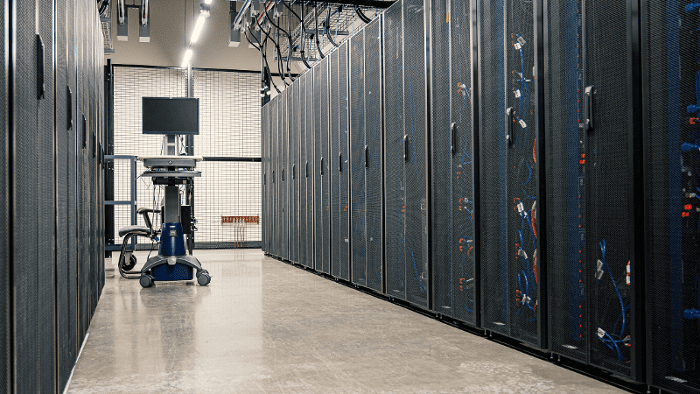Mission critical IT demands a level of service that goes beyond the norm in other industries. 99.99% uptime isn’t enough: 99.999% is the gold standard. To get there, database centers need to maintain exceptional rigor in the physical environment.
According to ASHRAE recommendations, a class A1 data center should aim for a temperature of 64.4°F, never to exceed 80.6°F. Class A1 data centers should use the tightest environmental controls available. Many of them maintain a relative humidity of 30% or lower.
“Class A1” refers to essential data center equipment including most enterprise servers and storage hardware. This equipment is subject to shortened service life and unpredictable operation if high temperatures or humidity is allowed to persist for even a short period of time.
Because servers can generate an enormous amount of waste heat, and may be racked together with dozens of units in a room, cooling systems work hard 24 hours a day. The data center’s layout must be planned out for the best thermal performance and the HVAC system must be maintained carefully.
All these factors become even more demanding in the heat of summer.
2023 May Hold More Record Heat in Store – Be Sure Your Data Center is Ready
Forbes Magazine reports that major heat records were broken over the last eight years, the hottest on record. To name just a few, Europe’s 2022 heat wave broke records across twelve countries. Many of those countries had set those records the previous year.
The summer of 2021 was the hottest ever on record here in the United States. The average temperature in the continental U.S. exceeded that of the Dust Bowl summer of 1936. What about 2022? There’s not much good news there: It wasn’t as bad, but still ranked as the third warmest in U.S. history.
Even the Arctic saw heat records shattered. The highest temperature ever recorded north of the Arctic Circle went to Verkhoyansk, Russia in 2020, where thermometers topped 100°F for the first time ever. Compare it to Imperial, California, which clocked in at 119°F during rain on July 24, 2018.
The long and the short of it: Temperatures are going up, and appear to be on trend for even hotter days to come. Facilities in the South and Southwest should be especially careful to make sure that their HVAC system is optimized for unprecedented demand. And that means being confident in your compressor.
Is It Time to Replace Your Data Center’s HVAC Compressor?
A commercial compressor is at the heart of any high-performing HVAC system. The compressor does the mechanical work necessary to make refrigerant gas available to the other components. It works harder if those other components are damaged. And if it stops working, the entire system grinds to a halt.
Organizations that depend on 24-hour cooling and refrigeration often have few opportunities to replace their commercial HVAC compressors. They may even fall behind on compressor maintenance. Sooner or later, though, it is important to have a replacement plan in place. This is especially true for data centers.
To meet environmental standards, many data centers have made commitments to reduce their energy use. But unless you have the budget of Google, this is a constant balancing act. As the compressor ages, it draws more power, especially in the second half of its 8-10 years of effort.
It may be time to replace your HVAC compressor if any of the following is true:
- Your compressor is more than seven years old
- Your compressor is no longer performing as desired
- You are spending more on repairs or on HVAC energy use
Compressor Remanufacturing Provides the Perfect Opportunity for Your Data Center
If your enterprise is aiming for carbon neutrality but can’t afford to compromise on quality, you might be best served by a remanufactured commercial compressor. With a remanufactured commercial HVAC compressor, you don’t need an all-new compressor core fabricated to meet your needs; this in itself cuts down on waste and a 100% new compressor might not be available from the OEM.
When buying a compressor from an OEM-affiliated wholesaler, you might end up waiting too long for a replacement if your required make and model aren’t readily available. By contrast, a remanufacturing team can get started right away by using a core from their existing inventory or using your existing compressor core.
Compressor remanufacturing is a complete re-engineering process that touches every element of the HVAC compressor. The unit is opened and thoroughly cleaned inside and out. Every individual component is checked for compliance and those that do not adhere to the highest expectations are replaced.
Each remanufactured compressor undergoes a battery of tests in a very specific order. This is part of the expertise that goes into ensuring your remanufactured commercial compressor meets all the quality and environmental benchmarks that applied to the original unit. And because it can all get done in days rather than months, it’s perfect for keeping your data center cool on a tight timeline.












